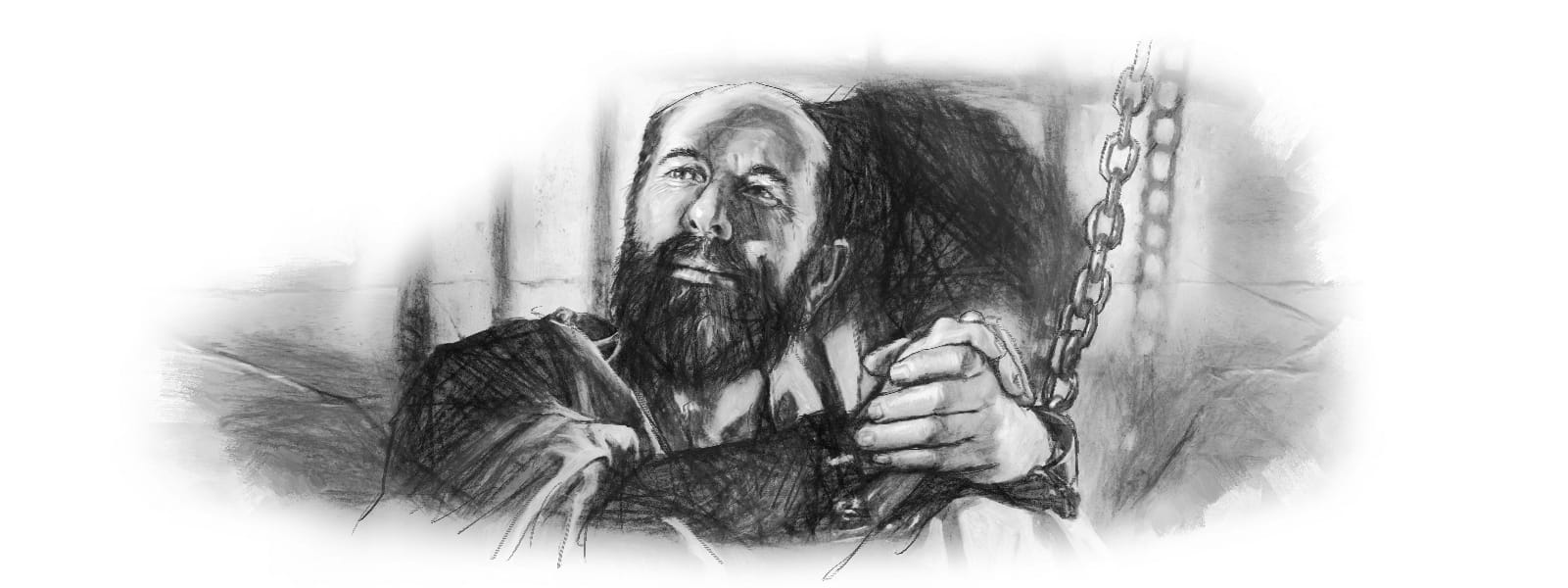20210313 04
Sabbath: Persecuted but Not Forsaken
Daily Lesson for Sabbath 27th of December 2025
Read for This Week’s Study
Ephesians 3:1; 2 Corinthians 4:7-12; Acts 9:16; Philemon 1:15-16; Colossians 4:9; Philippians 1:1-3; Colossians 1:1-2.
Memory Text:
“Rejoice in the Lord always. Again I will say, rejoice!” (Philippians 4:4, NKJV).
An Adventist pastor, imprisoned on false charges, spent nearly two years behind bars. Though at first greatly perplexed, he realized the prison was his God-given mission field. When his fellow prisoners learned that he was a pastor, they asked him to preach. He did, and he gave out literature too. He even baptized prisoners and conducted Communion services.
“At times,” he admitted, “it was difficult ministering in the prison, but there was also joy, especially when you saw prayers answered and lives changed.”
Paul wrote Philippians and Colossians from prison (see Philippians 1:7, Colossians 4:3). In fact, in Philippi itself, after Paul and Silas were unjustly accused, the jailer put “their feet in the stocks” (Acts 16:24, NKJV). At midnight, they were “praying and singing hymns to God, and the prisoners were listening to them” (Acts 16:25, NKJV; emphasis supplied). Truly they knew how to “rejoice always.”
This week we’ll look at the circumstances that Paul faced. He saw a larger purpose for what happened to him, and perhaps we can learn from him when we, as we inevitably do, face our own trials.
*Study this week’s lesson to prepare for Sabbath, January 3.
Introduction: Uniting Heaven and Earth
Think of the hardest job you’ve ever done. What made it hard? Was it the expectations, or the time allotted for the work, or both? Was it your attitude toward the task? Or perhaps it was the people you worked with? Or maybe it just seemed like an impossibility to ever succeed?
Consider the purpose of the plan of salvation: uniting heaven and earth. Sound impossible? Humanly speaking, it certainly is. Nevertheless, just before ascending to heaven, Jesus gave the apostles a seemingly impossible assignment: ” ‘Go therefore and make disciples of all the nations, baptizing them in the name of the Father and of the Son and of the Holy Spirit, teaching them to observe all things that I have commanded you’ ” (Matt. 28:19-20, NKJV).
Jesus sent Paul to the Gentiles to accomplish this seemingly impossible task: ” ‘To open their eyes, in order to turn them from darkness to light, and from the power of Satan to God, that they may receive forgiveness of sins and an inheritance among those who are sanctified by faith in Me’ ” (Acts 26:18, NKJV).
Some might throw up their hands when given jobs like that. However, we should not overlook the promises Jesus gave on both these occasions. To the apostles, He added, ” ‘And, lo, I am with you always, even unto the end of the world’ ” (Matt. 28:20). And to Paul, Jesus said, ” ‘ “I have appeared to you for this purpose, to make you a minister and a witness both of the things which you have seen and of the things which I will yet reveal to you” ‘ ” (Acts 26:16, NKJV).
In short, Jesus gives humanly impossible tasks so we will rely on Him, rather than on ourselves, to accomplish them. He never gives us a job without supplying the power to do it. “As the will of man co-operates with the will of God, it becomes omnipotent. Whatever is to be done at His command may be accomplished in His strength. All His biddings are enablings.”–Ellen G. White, Christ’s Object Lessons, p. 333.
Amazingly, by the time Paul wrote to the Colossians, the gospel had been “preached to every creature under heaven” (Col. 1:23, NKJV). Of course, not all accepted it. But if we look carefully at the commissions He gave to the apostles (Matt. 28:18-20), and to the apostle Paul, Jesus never promised all would become disciples or all would be converted. The gospel is to be ” ‘preached in all the world as a witness to all the nations, and then the end will come’ ” (Matt. 24:14, NKJV, emphasis supplied). What does that witness look like? How exactly is it to be accomplished?
This quarter we’ll study Paul’s epistles to the Philippians and to the Colossians. They have important similarities. Above all, they reveal Christ, the only One able to unite heaven and earth. He is the ladder Jacob saw stretching from earth to heaven (Gen. 28:12; compare John 1:51). As the Son of man and the Son of God, He redeems us from sin, and He intercedes for us.
In studying these letters, we will see both these aspects of Jesus. We’ll consider some of the most sublime statements found anywhere about Christ’s divinity and how He gave it all up to save us. We’ll see Paul wrestling from prison with problems in one church he raised up (Philippi) and in one that he himself never even visited (Colossae). The connections Paul established throughout the “world church” of that time enabled him, even from a Roman prison, to respond to challenges. He knew his time was short, and he did all he could to draw the church closer to heaven and to each other. In so doing, he shows us how God’s church today can unite with heaven to fulfill the last-day commission of Revelation 14, which we know as “the three angels’ messages.”
Clinton Wahlen, Ph.D., is an associate director of the Biblical Research Institute at the General Conference. His expertise is in the New Testament, hermeneutics, and Adventist history. He has lived and worked in Germany, New Zealand, Russia, the United Kingdom, and the Philippines. He and his wife, Gina, have two grown children, a daughter-in-law, and two grandchildren.
13: Choose This Day! (Joshua 24) – Teaching Outline
Introduction: A physician my wife and I knew in college died recently. He knew he was dying, so he had the time to write a note to be read at his funeral. If you knew you were dying, what would you write?  If I were writing one now, it would be a note of gratitude for God’s kindness. I don’t think I would write to tell my children what to do, because they are adults and they know what to do. My wife knows a man from her hometown whose father died. Before he died, he was able to write a note which informed his surviving children what terrible people they were. Our study this week is the message Joshua proclaimed to the people before he died. Let’s dive into our study of Joshua to study his message and find what we can learn from it.
If I were writing one now, it would be a note of gratitude for God’s kindness. I don’t think I would write to tell my children what to do, because they are adults and they know what to do. My wife knows a man from her hometown whose father died. Before he died, he was able to write a note which informed his surviving children what terrible people they were. Our study this week is the message Joshua proclaimed to the people before he died. Let’s dive into our study of Joshua to study his message and find what we can learn from it.
I. Early Pagan Beginnings
A. Read Joshua 24:1-2. Joshua tells the people that their ancestors served other gods. What do you think is his purpose in this? (Some spouses like to remind the other of their humble beginnings. “I married you when you were poor and uneducated…”)
- If you were the spouse with the humble background, would you appreciate hearing that?
- Or would it make you feel grateful?
- Let’s look at another possibility. Could it be that God mentioned that Terah followed other gods to say something positive to the people? (This sounds like God had a very limited number of people who followed Him. But He saw potential in Terah’s son Abraham.)
B. Read Joshua 24:3-5. What point is Joshua making here that could be helpful? (The helpful point is that God has been actively involved with Abraham and his descendants. Because Abraham chose God, his life was different.)
- Notice verse 4. What do you conclude from the fact that Joshua mentions Esau only once even though he is a son of Isaac? (This shows us election. Isaac, even though he was flawed, wanted to have a relationship with the true God. Esau apparently did not and that ended his recorded journey with God.)
II. The Journey With God
A. Read Joshua 24:6-8. What point is being made about having a relationship with the true God when you face large obstacles in life? (God will make you a victor. He will give you success.)
- Notice that Joshua did not mention the most frustrating time of his life, the first time they approached Canaan and turned away because of a lack of faith. Why is there no mention?
B. Read Joshua 24:9-10. Why do you think Joshua mentioned the Balak and Balaam story? What is different about the conflict with King Balak’s people? (King Balak tried to manipulate the prophet Balaam to have the true God curse Israel. This is not a story about opponents relying on other gods, this is a story about an opponent appealing to the true God.)
- What important spiritual point do we find in verse 10? (God was faithful. He did not “listen” to Balaam.)
- What kind of situation in your life would make this point relevant and comforting to you? (Your opponents may be in your church. They may appeal to your God. If you are faithful to God, He will be faithful to you.)
C. Read Joshua 24:11-13. What point is Joshua making when he refers to the “hornet” and vineyards and olive orchards that they did not plant? (God will do the hard work when you face opposition. He used an insect to defeat nations. He gave them a reward they did not have to build or plant.)
III. The Decision
A. Read Joshua 24:14. What does this tell us about Joshua’s audience? (Some of them still have other gods with them.)
- Does this fact speak to you? Do you still cherish sins that you know are not right?
B. Read Joshua 24:15. This says that some in the audience thought it was “evil” to serve God. Does this suggest that my question about “cherished sins” is inappropriate? (If you think something is “sin,” then you have made a choice for the true God. This reference to people who knowingly and willingly reject God is a different sort of problem.)
- Is the advice to “choose God” relevant to those who have already chosen God? (Yes. Recall that Moses had several failures even though he chose God. We need to keep choosing God even when the choice is only how to better choose God.)
- Was it necessary for Joshua to tell the people at the end of his life that he and his family will serve God? (Joshua was their leader. Leaders need to inspire by their words and their example.)
C. Read Joshua 24:16-18. The people respond positively to Joshua’s challenge. What is their stated reason for choosing the true God? (They agree with Joshua’s statement of the great things God has done for them in the past.)
- Is this a part of your decision-making in choosing God? (I think this is an extremely important point. When I face challenges, I think about how God has helped me in the past and it gives me confidence for the future. On the other side, I remember a couple of times when I actively considered turning away from God and it made me fear. How could I live without God by my side?)
D. Read Joshua 24:19. Wait a minute! Joshua is encouraging the people to serve God, and then Joshua says, “Well, you cannot do it.” How should we interpret that?
- Let’s try to break this down logically. What is the reason why Joshua seems to suddenly say that they cannot serve God? (God is holy. God is jealous (meaning He demands exclusive loyalty). God will not forgive sin.)
- a. Whoa! We know something seems wrong with this last point. We have read the New Testament, God does forgive sins. Is Joshua getting off the right track?
E. Read Joshua 24:20. Joshua threatens the people by saying that God will hurt them if they serve foreign gods. Is this true? Is this how Joshua should present God?
F. Read Joshua 24:21. Despite Joshua telling them they cannot do it, and threatening them, the people respond, “No, but we will serve the Lord.” Do they disbelieve Joshua?
- Have you ever heard something like this before? A person who wants you to do something tells you that you cannot do it? (This was my brother’s job at one point in his life. He flew around the country telling people who wanted to become movie stars that they could not do it. My brother’s employer made money taking photos of those who wanted to become stars and putting those photos in a directory that was sent to movie producers. This came at a price! Telling these aspiring actors the truth made them more determined to try.)
G. Read Joshua 24:22. Why does Joshua tell them that they are witnesses “against yourselves?” (He is impressing on them the importance of their words. Choosing God exclusively is a serious matter.)
H. Read Joshua 24:24-26. What else is Joshua doing to elevate the importance of the decision to choose God? (He writes it in a book and he sets up a large stone by the sanctuary to memorialize this decision.)
I. Let’s skip down and read Joshua 24:31. Did Joshua’s final message accomplish its purpose? (God’s people were faithful even after Joshua died. They were faithful during the lives of the elders who were present with Joshua.)
IV. A Life Well-Lived
A. Read Joshua 24:29-30. How would you describe Joshua’s life? (He was God’s man, even from his youth. He was one of two (with Caleb) faithful spies who argued they should immediately enter Canaan. He suffered 40 years in the wilderness because of the unfaithfulness of others. He remained faithful and led the charge to rely on God to enter Canaan and take the land promised them. He was a faithful advocate for following the Lord.)
B. Friend, will they say the same about you after you have died? Will you remain a faithful advocate for God even through frustrating times? Will you stand strong and serve God only?
V. Next week: We begin a new series of studies on Philippians and Colossians.
Copr. 2025, Bruce N. Cameron, J.D. Scripture quotations are from the ESV® Bible (The Holy Bible, English Standard Version®), copyright © 2001 by Crossway, a publishing ministry of Good News Publishers. Used by permission. All rights reserved. Suggested answers are found within parentheses. If you normally receive this lesson by e-mail, but it is lost one week, you can find it by clicking on this link: http://www.GoBible.org. Pray for the guidance of the Holy Spirit as you study.
Choose This Day! – Hit the Mark Sabbath School
What does it mean to serve the Lord with sincerity and truth? Join the Hit the Mark panel as they discuss Sabbath School Lesson 13 – Choose This Day! It’s the fastest hour of the week!
Dio è rimasto accanto a Giosuè… e resta accanto anche a te. #scuoladelsabato
Scegli questo giorno! È l’invito con cui si chiude lo studio del libro di Giosuè. Un richiamo deciso ma pieno di speranza. Source: https://www.youtube.com/shorts/TI0e4MHBRck
Why Holiday Dinners Are Not the Time to Defend the Sabbath

Holiday dinners have a way of turning otherwise reasonable Adventists into unpaid, uninvited evangelists to their relatives. No one asks about church. But the wine comes out. The bacon sizzles. And someone casually mentions relaxed Saturday plans that don’t involve church. That’s when it hits. Suddenly we feel the need to explain why we’ll be […] Source: https://atoday.org/why-holiday-dinners-are-not-the-time-to-defend-the-sabbath/
God’s Greatest Gift To You
Christmas is a wonderful time to remember God’s greatest gift. That gift is Jesus Christ. Through Him, you are welcomed into God’s family because of His grace. As the new year approaches, rest in your identity as a child of God and move forward in hope. Let’s talk about what Jesus has done in your life this year. Share your thoughts in the comments below. #HappySabbath #AWR360 Source: https://www.youtube.com/shorts/4GsRJyb14ew
God First: Your Daily Prayer Meeting #1227
Bible verse of the day: Psalm 46:1 – "God is our refuge and strength, an ever-present help in trouble." Welcome to our Daily Prayer Meeting! This is a safe space where you are seen, heard, and prayed for. Start your day in God's presence—every day at 8AM ET, we share a short devotional from God's Word and lift your prayer requests to Him. You're not alone! Our prayer team is here to intercede with you and for you. Whether you need prayer, celebrate a breakthrough, or start your day with Jesus, you're in the right place. Share your prayer requests or testimonies of praise here: https://wkf.ms/3DBuapQ Engage with us in the comments:
• How can we pray for you today?
• Where are you watching from?
• What are you thankful for? How has God answered your prayers?
Let’s grow together in faith, hope, and love—one prayer at a time. Don’t forget to subscribe and turn on notifications so you never miss a prayer. 🔔 Share this video with someone who needs hope or tag a loved one who needs encouragement today. Today’s Message: Pr Joel Sarmiento The Seventh-day Adventist Church has been an established denomination since 1863. It is a global Christian family with over 21 million members who hold the Bible as the ultimate authority. We are believers committed to helping people understand the Bible to find freedom, healing, and hope in Jesus.
Want to learn more about the Seventh-day Adventist Church? Visit our website at: https://www.adventist.org/ Find us on social media by following the links below: Facebook:
https://www.facebook.com/theadventistchurch
Instagram:
https://www.instagram.com/adventistchurch
Twitter/X: https://twitter.com/adventistchurch 👉 Want more prayer moments?
Watch our full playlist of daily prayer videos here: https://youtube.com/playlist?list=PL-k2Gb-DBYo–V8axD7iFUL6TFEckrhxv&si=vIljgfwrSZN6iJR2 GodFirst, DailyPrayer, PrayerMeeting, ChristianPrayer, MorningDevotional, HopeInJesus, BibleVerseOfTheDay, PrayerRequest, FaithCommunity, SeventhDayAdventist Source: https://www.youtube.com/watch?v=53wXvY1Acpw
- « Previous Page
- 1
- …
- 78
- 79
- 80
- 81
- 82
- …
- 4842
- Next Page »





